History of Freemasonry from its rise down to the present day [1866] by J. G. Findel, editor of the German masonic periodical “die Bauhutte“, honorary member of Minerva Lodge, Hull, and of several German, French, and Italian Lodges.
Translated from the second German edition under the author’s personal superintendence.
Introduction
Freemasonry and its Organisation
From its very first existence the Society of Freemasons has attracted the observation of the world; it has been very suggestive to and been thought worthy of the attention of many of our best and most able men and has secured to itself the sympathy of well cultivated minds of all ranks and conditions.
Without protection either from Church or State, scarcely tolerated in many countries, sometimes even cruelly persecuted and oppressed, it has, notwithstanding, in the course of a few centuries, from an inconsiderable number of true and sincere followers, increased to an association extending over the whole of the civilised world,
– including within its fraternity several thousand men of the most varied shades of opinion and of religion,
– who in this community, exempt from the restless agitation of active life, have united to exercise a salutary influence over one another,
– by elevating mind and soul to purer, clearer, and sublimer views of mankind in general, and their own individual existence.
Although much has been done to bring it into disrepute, and to cast unworthy suspicions upon its efficiency and its tendency, yet it not only still exists, but has in the course of years, enlarged its sphere, and developed its resources, and has in no small degree contributed to raise the tone of social life, and assisted in the moral improvement and general culture of the people.
Being based upon eternal truth and the unchangeable requirements of our nature ; it has, notwithstanding its manifold errors, faithfully fulfilled its pacific and exalted mission,
– inclining its members to love and charity, to moral courage and fortitude, to truth and the conscientious discharge of known duties;
– it has comforted the afflicted, brought back the erring to the path of virtue, dried the tears of widows and orphans, and is the parent of many an institution for benevolent purposes.
The great and mighty ones of the earth have joined themselves to the fraternity, simple-minded citizens have under its influence been made to feel their own innate dignity,
– friendship has seen many a smiling blossom flourish on its stem, and good and virtuous men,
– separated by the conventionalities of social routine, have here found themselves united for noble aims and purposes, who might otherwise have never been brought together.
The vast proportions which this Society has assumed, the mystery involving its origin and early development,
– the different forms it has adopted in different countries, not only with regard to its constitution, but also to the customs incorporated with it,
– the destruction of many manuscripts, together with other circumstances have rendered an investigation and a reliable delineation of its history, exceedingly intricate, but by no means impossible.
The zeal of a few devoted inquirers has shed light upon the chaos of contradictory opinions, elicited facts, and made whole epochs emerge from the obscurity surrounding them.
It is upon the authority of some valuable works issued in the course of the present century, that is had been possible to produce a history of Freemasonry.
Before proceeding however to a more detailed description of it, it is first necessary to say a few words concerning the nature of Freemasonry and the organisation of the Society.
Freemasonry
Freemasonry, which by its followers is most justly described as an art, as the Royal art, is to the Masonic Brethren, what religion is to the Church, what the substance is to the form.
The former is everlasting and unchangeable, the latter is dependent upon the variations to which time, place, and persons are exposed.
Up to the commencement of the present century, scarcely any but Germans expressed any very clear ideas concerning the nature of this Society,
– and amongst the first who deserve to be especially mentioned are Lessing in his “Ernst and Falk”, Herder in “Adrastea”, Krause and Fessler,
– and of still more recent date O. E. Funkhanel, 0. Marbach, and Rud. Seydel are conspicuous;
– the latter especially in his work “Discourses on Freemasonry to reflective Non-Masons”, which was received with well-merited approbation, has shown how the present nature, form, and efficiency of the Fraternity logically follows out of the essential idea of Freemasonry itself.
As Freemasonry is not a dogma, but an art, working only upon man’s intellectual faculties, it cannot be taught fully in words;
– by active participation in Freemasonry itself, by social intercourse with its members, must it be learned and tested.
Seydel says that Freemasonry is that disposition of the mind, in which the good or spiritual instinct prevails over its antagonistic principle
– i. e. over egotism, and this mastery obtained by our higher instincts, in however slight a degree, is the only qualification insisted on, in order to be received into the Masonic Fraternity.
The Masonic Fraternity
The purest and most perfect exemplification of religious impulse, of goodness, of piety, of holiness cannot be concentrated in a single individual, but only in a Society of individuals,
– organized on this firm basis, that all its members agree on this one point, viz:
– that they do not seek their own selfish interests, but the general and spiritual good of the whole,
– according as it is assigned to each individual to see, apprehend, and demonstrate, that he endeavors to mortify through life all selfish impulses,
– every thing tending to disunion both in himself and around him,
– that the universal and intellectual advantage of all may prevail, and become the fountain whence each derives happiness.
From this Fraternity then they are not excluded whose creed is different, but only those whose nature and desires are opposed to this.
This union of all unions, this association of men, bound together in their struggles to attain all that is noble, who desire only what is true and beautiful, who love and practise virtue for its own sake — this is Masonry.
It is the most comprehensive of all human confederacies, the outward circle, enclosing and concentrating all smaller ones within its precincts, and therefore the purest and sublimest form of human association,
– there being really no other moral and religious union, which like this is based on the purity and genuineness of the divine instinct within us, which is the groundwork in the character of all good men.
Therefore is Freemasonry the most perfect representation of that inward wrestling for the reunion of the scattered sparks of divine light, for the reconciliation between God and his creatures, between man and his fellow-man, and therein too, lies its historical and intellectual title to be called into existence.
Here do we find the contradictions between Mankind and the history of the human race reconciled; the virtuous out of the multitude are here gathered as in a Temple, the band of faithful believers, as well as the isolated individual.
However these contradictions are by no means permitted to remain quietly in close proximity, but each member forms one of an alliance united for mutual instruction and interchange of thought, for the polishing down of all that is harsh and inharmonious, that in loving fellowship they may approach more nearly to their ideal, until at length all incongruities are reconciled and made to accord in sweet harmony.
The Work of a Mason
Life, progress, and activity are better suited to us mortals, than the assertion, the work is complete, there is no more that we can do.
Our Fraternity has not yet reached perfection, but is still developing and extending.
The ideal excellence after which it aspires is that condition in which God’s will is the will of all mankind.
Moral perfection as it is the aim of the human race, is also its aim.
The Mason for his part must with hand that is never weary, and an ever watchful eve, in close communion with his Brethren strive to attain this design.
Above all he must begin with himself if he wishes to carry out the moral and intellectual advancement of the human species;
– he must endeavor to arrive at self-knowledge and incessantly aspire to perfect himself,
– that the gladdening, blessed, and inspiring principle of love within him, may be gradually disencumbered of the fetters of selfishness, sensuousness, and supineness which bind it,
– then will his aim be to diffuse truth, beauty, and goodness around him in his daily life and to further the welfare of mankind in obedience to God’s law, and with no selfish end in view.
The Lodge
The place in which the Freemasons assemble to work in common is called a Lodge, and the assembly itself, in which the precepts of Masonry are propounded and mutually practised, bears the same name.
Men having but one purpose, have found themselves in one Lodge, longing to reach the highest and best this earth has to offer.
All that has been acquired in their mental struggles with much toil and labor, may here in the Lodge be very appropriately deposited and presented for the profit and delight of each other,
– to the mutual advantage both of themselves and their brethren, either by making them aware of their own progress or by placing before them the stirring example of others,
– so that the words of Schleiermacher may be well applied to the Lodge:
To present a life passed according to the dictates of reason and godliness, is regarded by each member as a study, an art, and therefore engages each one to strive to perfect himself in some one particular.
A noble emulation prevails in the Fraternity, and the desire to offer something which may in some degree be worthy such an assembly, incites each one faithfully and assiduously to appropriate to himself whatever seems to be marked out for him in his particular sphere.
The more ready the members are to communicate their thoughts to each other, the more perfect will be their fellowship.
No one member has his knowledge from himself alone, he is at the same time a participator in the knowledge of others.
Thus the Lodge is an active Institution, not merely for the bringing together of faithful friends in a Society modelled according to the perfection of good Fellowship but likewise for the purpose of educating its members for the world, for mankind.
In this sense Lodges may be called veritable workshops;
in which the members work, in order that the type of human nature, in its original purity, of which in the manifold changes and mutilations humanity is subject to, much has been lost, may be restored and revived, first in the narrow circle of the Fraternity, and further perfected when actively working in concert, to be still more widely disseminated, and made attainable to all mankind.
To this explanation of Freemasonry, we will add a few remarks, touching its relation to Church and State and its outward form.
The Position of Freemasonry Towards the State
The position Freemasonry assumes towards the state, the State is a perfectly friendly one, as one of its fundamental laws prohibits all political discussions, educating its members to become good citizens, enjoining them to promote the general welfare, and fostering in them conformity to law, and the love of good order.
Whatever difference of opinion we may express upon other points (as freedom of conscience is by us accorded to every one), yet herein are we all of one mind, viz:
– that we patronize the arts and sciences, and demand the practice of the social virtues, faithfully and conscientiously avoiding giving offence to any government whatsoever, under which we may assemble peaceably in due form.
Therefore it is the interest of every State to favor Freemasonry, — as Lessing correctly observes:
Wherever Freemasonry has appeared, it always has been the sign of a healthy, vigorous government, as it is even now the token of a weak and timid one, where it is not sanctioned.
This opinion has been confirmed at different periods by competent authorities.
Position of Freemasonry Towards the Church
Freemasonry takes a similar position towards the Church, as is does to the State.
All doctrinal tenets it makes it a rule to leave un- touched, keeping aloof from all religious entanglements, which the numerous sects have fabricated, esteeming and honoring every form of faith, insisting above all things that its members should display Toleration and Charity in their daily Life.
Genuine masonry has to deal with man as man, and by making its followers good men, it necessarily trains them to be good members of the religious communities to which they belong.
The hostile attitude assumed by the Catholic and other Churches towards Freemasonry (wherever it has not been abandoned) is not, nor ever will be a proof of the mischievous tendency of this Institution, but only of unfounded misrepresentations and inventions, and above all ignorance of its real nature and influence.
Neither is there any foundation for the often repeated reproach that Freemasonry favors religious indifference;
– it relies chiefly on connecting mankind with that common link, which is the groundwork of all religions;
– for the only thing it takes into consideration, is the inward moral worth of its followers, leaving to each one his own individual opinion.
Thus Freemasonry is neutral ground for all political opinions and religious creeds, and within its Fraternity all political and religious controversies, which so greatly embitter life, and set mankind at variance, are happily avoided.
The Organisation of the Order
A Lodge is formed by the assembling of a sufficient number of members (the number is determined by rules of Grand Lodge), who upon proving satisfactorily, that they possess the necessary intellectual capacity, and have substantial means sufficient, apply to some properly constituted Grand Lodge, praying it to constitute them a regular Lodge, and to grant them a charter accordingly.
The Grand Lodge, as the supreme administrative power, grants them this,
– if no obstacles stand in the way, and consecrates the new Lodge, which henceforth has to conform to the Statutes and Rituals delivered over to it, and is then immediately received by all Lodges throughout the world, as a regularly constituted Lodge, and enjoys all the privileges of the same.
Lodges which are defectively constituted are called irregular or unwarranted Lodges, and their members are not admitted as visitors into regularly formed Lodges.
The Lodges, called St. John’s Lodges, are so named because they reverence St. John the Baptist as their patron, and are divided into three degrees, the apprentices, the fellow-crafts, and the master-masons.
Lodges which during war work in the field are called Field Lodges.
Each Lodge bears a symbolic name, to which is added the name of the place where it holds its sessions; for example “Eleusis of Taciturnity” at Bayreuth.
At the head of each lodge is a Board of officers elected by a majority of votes.
The affairs of the Lodge are under the direction of the W. Master (Master of the Lodge) and under him the Deputy and two wardens.
Besides the three original degrees in accordance with the spirit of Freemasonry, there exist in some branches of the Fraternity the so called higher degrees which are conferred in the Scotch or St. Andrew’s Lodges, also in the Chapters, but which are foreign to the real spirit of Freemasonry, and an innovation which crept in at the time of Masonic degeneracy.
All business, initiations, and promotions take place in the Lodge.
Every regularly initiated Freemason, has free admittance into any Lodge in the world, and meets therein a brotherly welcome.
All the St. John’s Lodges under the direction of a Grand Lodge, form a league, called also a rite or system, and most of the Grand Lodges are placed in communication with each other by means of representatives (who act as ambassadors), exchanging the records or minutes of their transactions.
At the head of the Grand Lodge is the Grand Master assisted by a Board of grand officers, which is the case in every St. John’s Lodge.
The Grand Lodge is composed either of representatives or proxies from subordinate Lodges, and of officers chosen by them, and has either a fixed place for its assemblies, chiefly in the capital of the country, or meets at different places in rotation.
Those Lodges which are united to a Grand Lodge have a constitution in common, which being almost everywhere imbued with the spirit of Liberty, Equality, and Fraternity, has an absolutely democratic basis.
In some Grand Lodges it is true, a more hierarchical form of government is adopted, little suited to the dignity of free men.
In Freemasonry, the fundamental idea is that of a general priesthood, capable of voluntary action, and of self-government
– therefore the Grand Lodge should not be a court of jurisdiction, and still less a dogmatic body, but a purely administrative and representative body, all governmental and legislative sovereignty being vested in the subordinate Lodges.
The unity of the Masonic Fraternity is entirely an intellectual unity, depending upon harmony of thought; there is not such a thing as a supreme power in which the whole authority of the Fraternity is vested alone.
Certain fundamental laws have an authoritative influence over the whole Fraternity, but besides these every Grand Lodge and every subordinate Lodge has by-laws of its own to which every brother as long as he remains a member must conform as well as conscientiously submit to, and practise the duties he has solemnly promised to fulfil.
The duties of a Freemason, far from being opposed to his duty to God, to himself and others, do but invest these obligations with a more sacred character.
Members who are guilty of repeated violations of the laws of the Fraternity, or of conduct unsuitable to the dignity of the Institution, must in case the admonitions and corrections of their Brethren prove ineffectual, be turned out of the Lodge and consequently out of the Fraternity.
Freemasonry lives and instructs in Emblems and Symbols in which the leading idea is that the Freemasons are in reality a company of real Masons, their object being the erection of a spiritual Temple.
Every Freemason and every Lodge must strive to attain Light, Truth, and Virtue,
– which is the reason that the Lodge is regarded as the centre and source of Light, and as the W. Master takes his seat in the East, it is called “Orient”.
Most of the Symbols have been taken from the tools of operative Masons, and have been made to bear a deeper and spiritual meaning.
Besides the general working Lodges, which are Lodges of initiation and instruction, sometimes extraordinary Lodges meet, as for example Festival Lodges and Funeral Lodges, the latter in memory of deceased Brethren.
Having in the preceding pages explained the nature of Freemasonry, and given a general idea of the character of the Institution, the history of which we are about to occupy ourselves with in the following pages, we will first make a passing inquiry into the progress of Masonic historical science.
Footnotes
Book Details
HISTORY OF FREEMASONRY
From its Rise Down to the Present Day
J. G. FINDEL
Editor of the German Masonic Periodical “die Bauhutte”, Honorary Member of Minerva Lodge, Hull, and of several German, French, and Italian Lodges.
Translated from the second German edition under the author’s personal superintendence.
WITH A PREFACE
BY
C. VAN DALEN, Dr.
F. M. of the Lodge “Friedrich Wilhelm zur gekronten Gerechtigkeit” at Berlin, representative from the Grand Lodge of Scotland to the Grand Lodge of Prussia “Royal York zur Freundschaft”, Editor of the German Freemason’s Calendar.
LONDON:
ASHER & CO. 13, BEDFORD STREET,
COVENT GARDEN
1866

History of Freemasonry
By: J. G. Findel (Author)
Excerpt from History of Freemasonry: From Its Rise Down to the Present Day
Worshipful Sir and Brother.
Your highly esteemed favour of Feb. 23, is received, and the intimation therein contained of your intention to dedicate your proposed English edition of a standard work upon Freemasonry, to the Most Worshipful Grand Lodge of Massachusetts, we deem a high compliment.
Dating as far back as 1733, the M. W. Gd. Lodge of Massachusetts, has the honor to be the oldest Gd. Lodge in America, she can therefore also assure you, that it has been the practice of this venerable Gd. Lodge, to disseminate masonic knowledge and principles, to their fullest extent. We gratefully accept your flattering honor of the dedication.
Recent Articles: in this series
 Book Intro: The Secret Doctrine Explore the profound synthesis of science, religion, and philosophy in H.P. Blavatsky's "The Secret Doctrine." Discover the true depth of Theosophy beyond the oversimplified term "Esoteric Buddhism" and uncover the universal wisdom that transcends religious boundaries. A compelling introduction to Theosophical literature and its broader, esoteric truths. |
 Book Intro - The craftsman and freemason's guide Dive into the enigmatic world of Freemasonry with Cornelius Moore's comprehensive guide. Uncover the symbolic rituals, trace the fraternity's historical roots, and gain a deeper understanding of this age-old society. Perfect for Freemasons and curious readers alike. Unlock the secrets of Freemasonry today! |
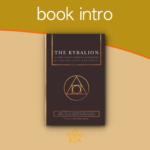 Unravel the secrets of the ancient Egyptian wisdom with our comprehensive guide to the Kybalion, by Three Initiates. Discover its influence on modern thought, the controversies surrounding it, and its seven profound Hermetic principles. Unlock the power of these timeless teachings to transform your understanding of life's mysteries. |
 Book Intro - The Working Tools of an Old York Master by Wilmshurst Unlock the Secrets of Freemasonry! Dive into the profound symbolism of 'The Working Tools of an Old York Master.' Discover the hidden meanings behind the square, compass, plumb line, and more. Embark on a transformative journey of personal growth and spiritual enlightenment. Uncover the ancient wisdom that has shaped generations of Masons. |
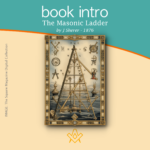 Book Intro - The Masonic Ladder by J Sherer Unlock the mysteries of Freemasonry with "The Masonic Ladder" by J. Sherer - - 1876. This 19th-century guidebook takes readers on a journey through the steps of the Masonic ladder, from the basic principles of the Entered Apprentice to the highest degree of the Sovereign Grand Inspector General. Discover the symbolism, allegory, and values of Freemasonry in this timeless classic. |
 Book Intro - The London mason in the seventeenth century The London Mason in the Seventeenth Century by Douglas Knoop offers a comprehensive examination of the lives and work of masons in the bustling city of London during the seventeenth century. The book delves into the intricacies of their craft, the socioeconomic and political forces that influenced their profession, and the role they played in shaping the architectural landscape of London. |
 Book Intro - History of Freemasonry, Gould, Robert Freke The History of Freemasonry is a comprehensive overview of the origins, development, and evolution of Freemasonry from its ancient roots to the modern era. The book explores the fascinating history of one of the oldest and most mysterious organisations in the world, which has been the subject of much speculation and curiosity over the centuries. - by Robert Freke Gould |
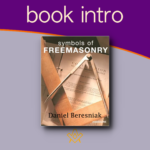 Book Intro - Daniel Beresniak Symbols Of Freemasonry This book is a collection of the symbolic images which Freemasons encounter on their journeys of transformation.' The texts and illustrations form an intimate dialogue whose subject is Freemasonry, and which casts light on the relationship between dreams and reality, reason, intuition and imagination. |
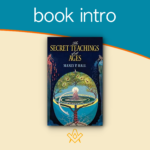 Book Intro - The Secret Teachings of All Ages by Manly P Hall The Secret Teachings of All Ages by Manly P Hall is a comprehensive and in-depth exploration of the various esoteric and occult traditions that have shaped human history. The book covers a wide range of subjects including alchemy, astrology, mysticism, and secret societies, and provides detailed explanations of the underlying principles and concepts. |
 Book Intro - Duncan's Masonic Ritual and Monitor Duncan's Masonic Ritual and Monitor is an impression of the Old York Rite published in New York in 1866. |
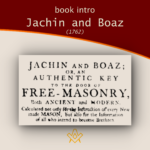 Book Intro - Jachin and Boaz (1762) Thirty two years after Samuel Prichard's Masonry Dissected (1730) a second detailed exposure was published Jachin and Boaz (1762) attributed to the same author, and met with equal distain by Freemasons of the time. However, these exposures offer the masonic historian an invaluable view in to how freemasonry was conducted during its early formation |
 Book Intro - Three Distinct Knocks (c.1760) Giving an exact account of all their proceedings in making a brother, with the three obligations or oaths belonging to the first second, and third degrees of masonry, viz. The entered apprentice, fellow-craft, and master-mason: with the obligating on belonging to the chair, and the grip and word. |
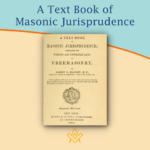 Book Intro - A Text Book of Masonic Jurisprudence An introduction to Albert Mackey's seminal work on Masonic Jurisprudence – the theory or philosophy of Masonic law. The Foundations of Masonic Law are to be found in the Landmarks, or Unwritten Law, and in the Ancient Constitutions, or the Written Law. These constitute the subject matter of the book. |
 Book Intro - The Perfect Ceremonies Of Craft Masonry 1871 A beautiful example of a the rituals, produced in a Medieval illuminated script style. Facsimiles still exist of this illustrated ritual book, of which the most authentically produced version is that available from the Scottish Rite Masonic Book Club. |
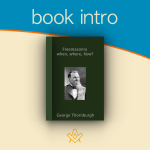 Book Intro – Freemasonry; when, where, how? Introduction to Freemasonry; when, where, how? By George Thornburgh |
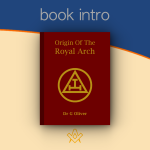 Book Intro - Origin Of The Royal Arch An introduction to the Origin of the Royal Arch, through the eyes of the English nineteenth century masonic author Dr G Oliver (1782–1867) |
 Book Intro – Symbolical Masonry Symbolical Masonry is a treasure-house of Masonic lore, including discussions of key concepts of the first three degrees, along with an extensive study guide. |
 This month we look at – 'A portrait gallery, with biographical sketches of prominent freemasons throughout the United States' |
 Extracted and abridged from The Mystic Tie: Or, Facts and Opinions, Illustrative of the Character and Tendency of Freemasonry By Albert Mackey, |
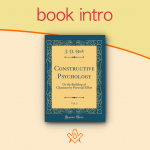 Book intro - Constructive Psychology The introduction to Constructive Psychology or The Building Of Character By Personal Effort by J D Buck a masonic author |
 book intro - Cagliostro: the splendour and misery of a master of magic Preface to the book by William Rutherford Hayes; Cagliostro: the splendour and misery of a master of magic |
 book intro - Origin of the Rosicrucians and the Free-Masons Historico-Critical Inquiry into the Origin of the Rosicrucians and the Free-Masons – Thomas De Quincey |
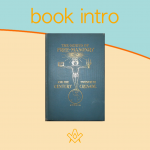 Book Intro - The Genius of Freemasonry The Genius of Freemasonry: “Has any brother anything to offer for the good of Masonry?” The following pages are the author’s answer to that question. |
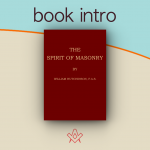 Book Intro - The Spirit of Masonry An essential source for anyone interested in exploring the inner mysteries of the Masonic Fraternity. |
 Book intro - History of Freemasonry Introduction to a classic masonic book by J. G. Findel, History of Freemasonry published 1866 |
 The Book of Constitutions for the Ancient Grand Lodge or Ahiman Rezon |
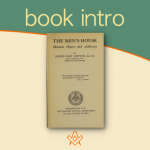 A short introduction to The Men's House, a collection of masonic papers and addresses |
 This is a general survey of Masonic origins, history and philosophy. It was at one time given to every new Mason in Iowa. |
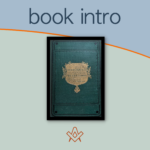 Book Intro - The Discrepancies of Freemasonry Written almost 150 years ago, this book contains wisdom still relevant today. |
 Book Intro - The Principles of Masonic Law "The first great duty, not only of every lodge, but of every Mason, is to see that the landmarks of the Order shall never be impaired". |
 Published in 1911, this fascinating book is equally relevant for the 21st century Mason with an interest in the more mystical side of Freemasonry. |
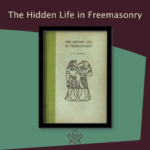 Book Intro - Hidden Life of Freemasonry Introduction to The Hidden Life in Freemasonry (1926) by Charles Webster Leadbeater |
 Book Intro - The Symbolism of Freemasonry Introduction to a classic masonic book; The Symbolism of Freemasonry: Illustrating and Explaining Its Science and Philosophy, its Legends, Myths and Symbols. |
 Book Intro - The Meaning of Masonry This is the Introduction to The Meaning of Masonry, a set of essays which discuss the esoteric side of Masonry |
 Book Intro - Illustrations of Masonry Introduction to Illustrations Of Masonry by William Preston (1742-1818) |
masonic knowledge
to be a better citizen of the world
share the square with two brothers

click image to open email app on mobile device








